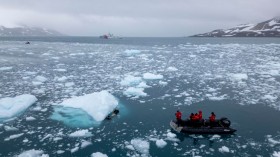It has long been known that sharks, as apex predators, can practically smell the fear of their prey as they stalk the ocean's depths. But new research is suggesting that that might all soon change, as the increasing acidification of ocean waters could be robbing sharks of their ability to sense the smell of food.
In a study recently published in the journal Global Change Biology, researchers found that after swimming in a pool of water treated with elevated levels of carbon dioxide, adult smooth dogfish - a small breed of shark - could no longer track the odor of prey, which was in this case released squid odor.
Disturbingly, the carbon dioxide concentrations used in the experiment are consistent with levels that have been forecasted for 2050 to 2100.
"The sharks' tracking behavior and attacking behavior were significantly reduced," Danielle Dixson, who took part in the study, said in a recent release. "Sharks are like swimming noses, so chemical cues are really important for them in terms of finding food."
And those chemical cues are apparently shrouded in the wake of high acidity, leaving sharks confused and less aggressive when dealing with prey. Imagine someone is dangling a freshly cooked steak right in front of your face, but for some reason you can't smell it's succulent aroma - you would be hesitant about eating it too.
Ocean acidification traditionally occurrs when carbon dioxide - a relatively potent greenhouse gas - is absorbed by ocean waters. There it dissolves and passively lowers the pH of the water, causing it to become more acidic.
Past research has found that acidic waters can disrupt a nervous system receptor called GABAA.
In the case of sharks, neurons no longer fire properly for the fish's sense of smell.
In the experiment, sharks from the high carbon dioxide pool spent less than 15 percent of their time in the water stream containing food stimulus, while a control group spent more than 60 percent of their time in the stream, looking for a tasty snack.
The researchers are quick to add that sharks are superior predators, and don't simply use their sense of smell to hunt. They can even adapt to acidic waters over time.
However, "it's the rate of change that's happening that's concerning," Dixson added. "Sharks have never had to deal with [increasing acidity] this fast."
[Credit: Jayne M. Gardiner, J Exp Biol, 2007]
© 2024 NatureWorldNews.com All rights reserved. Do not reproduce without permission.





